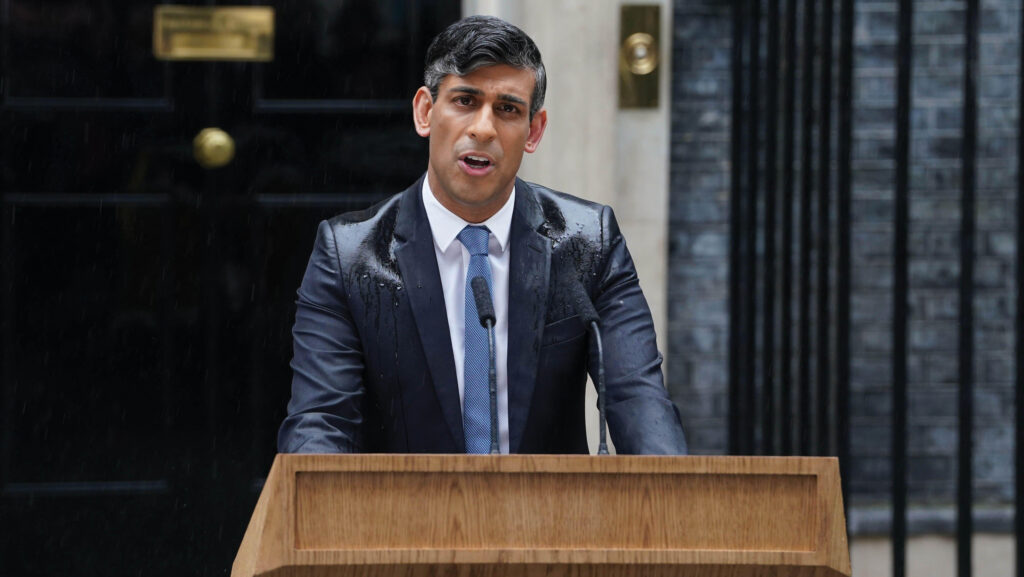Farming reacts to Sunak’s surprise general election call
 © PA Images/Alamy Stock Photo
© PA Images/Alamy Stock Photo Farmers and farming organisations have been giving their reaction to prime minister Rishi Sunak’s announcement of a snap general election.
In a rain-lashed speech, Mr Sunak took to the lectern outside 10 Downing Street to confirm the date as Thursday 4 July, at a time when British farmers will be harvesting crops.
The announcement of a summer election on Wednesday (22 May) took many people by surprise, including members of his own party.
See also: Key takeaways from Farm to Fork 2024
Political analysts said inflation falling to 2.3% in April partly prompted the decision by the PM to call the election now, rather than wait until the autumn.
Labour leader Sir Keir Starmer said the election offers an opportunity to “change the country” and “secure a better future”.
The ability to draw votes from rural areas will be a key battleground to whichever party forms the next government.
‘Put food first’ – NFU
The NFU is strictly apolitical, but it has published its own general election manifesto which outlines a number of key requests for the next government.
NFU deputy president David Exwood told Farmers Weekly the two key issues of the election for farmers will be securing a long-term budget for agriculture and “putting food first”.
“Farmers feel that food production is last on the list, not first. Of course, it’s about biodiversity, renewable energy, climate change; but for us, food and farming is at the heart of the debate.”
In Wales, NFU deputy president Abi Reader said farm support would be uppermost in Welsh farmers’ minds when they cast their vote.
“The key issue is all about budget. We need to make sure that the next Westminster government secures us a ringfenced budget for annual payments,” she said.
“That budget must reflect a real-time uplift in value and be fit for purpose.”
NFU Scotland president Martin Kennedy also highlighted future funding as the “key area” for farmers and crofters in Scotland.
Rural and urban similarities
Jill Rutter, a senior research fellow at UK in a Changing Europe, who was previously the programme director at the Institute for Government, said people living in rural areas are affected by many similar issues to their urban counterparts, such as the economy and state of public services.
“Sir Keir Starmer went to the NFU Conference before Rishi Sunak did and he was quite warmly received,” said Ms Rutter.
“There has always been a view that Labour is basically an urban party and does not ‘get’ the concerns of rural communities, but they have made efforts to address this in recent years.
“But the majority of members of the shadow cabinet represent urban constituencies while the Conservatives are more naturally considered to be the party of rural England.
“How that manifests itself will be very interesting.”
Ms Rutter said there are always “sensitivities” to the rural vote and single issues can sway voters, such as Labour announcing a foxhunting ban in 2004.
“Badger culling is a very big and emotive [issue] and is a very big dividing line for farmers tackling bovine TB,” noted Ms Rutter.
“Labour has always been very reluctant to cull badgers.”
In some rural seats, Ms Rutter expects the Liberal Democrats to offer strong competition to the Conservatives, as the party showed with recent wins in byelections in Tiverton and Shropshire.
Meanwhile, in Wales, possible cuts to the farm budget and planning issues may dominate rural policies, she added.
‘Make or break’ for countryside
The Campaign to Protect Rural England (CPRE) said the general election will be “make or break for the countryside”.
CPRE director of policy, campaigns and communications Elli Moody said: “The next government will be faced with era-defining decisions on housing, environmental protections and energy supply.
“These will have big impacts on rural communities and our finite supply of land.
“We urge all political parties to think about the future while tackling the priorities of today.”
